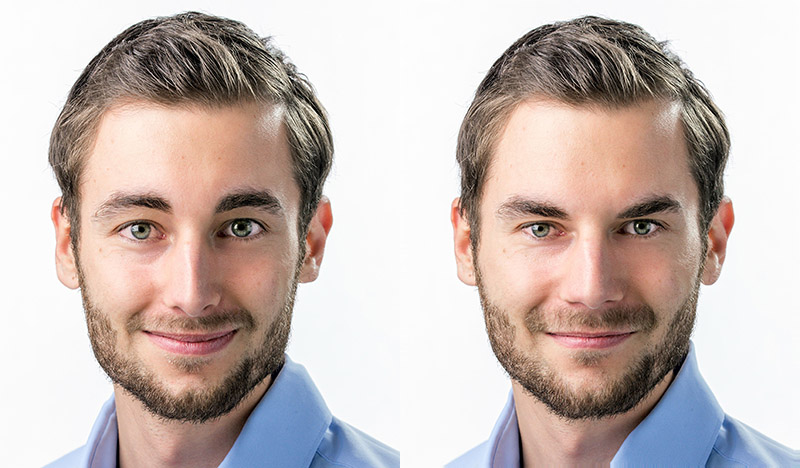Facial discrimination: “On Airbnb, I deliberately don’t look at the host’s photo”
A beautiful and trustworthy face can open doors. While those same doors slam in the face of the one we call unattractive or untrustworthy. Facial discrimination, TiU researcher Bastian Jaeger calls this injustice a major but still relatively unknown social problem.

You don’t have a choice. Not whether you come into the world as a man, woman, white, or black. And not whether you are given a pretty or less pretty face. That your color and gender influence your chances in society is evident. But that your facial characteristics also play a major role, much less so. It can even be a matter of life or death.
“Facial discrimination takes place in situations where people have to make a complex decision in relation to someone else. For example, is someone trustworthy or not? “There is no clear answer, but we can see what the other person looks like,” says researcher Bastian Jaeger. During his PhD research, he researched the mechanisms behind facial discrimination and possible solutions to this problem.
“What worries me most is that appearance also plays a role in the legal system. People who look less attractive or trustworthy are more likely to be found guilty of various crimes. Even when deciding on the death penalty, judges and juries allow themselves to be influenced by the appearance of the defendant. This is an extreme example, but it shows how consequential first impressions can be.”
The unreliable first impression
Our opinion of someone else arises immediately after the first sight, Jaeger explains. “As soon as you see someone’s face, and I mean within 50 milliseconds, you form an impression. You notice gender, age, color, but also how reliable and competent you find someone.”
Attractiveness plays a major role in that first impression. For example, we think handsome people are more social, smarter and more honest. According to Jaeger, what we are particularly sensitive to is whether a face shows emotional expression. “We pick up emotional cues very quickly from the other person. If someone looks grumpy, we reckon that he or she is probably angry and we will not easily try to get closer to that person. While with a smiling face, we think we are dealing with a kind and social person”.

We even see emotion in faces that do not express emotion at all. “When the corners of your mouth are naturally more down and you have prominent, frowning eyebrows, people quickly think you’re unkind or even untrustworthy. If your neutral face is the opposite, so mouth corners up and big open eyes, then we think, ‘Hey, I want to get to know that person better.’”
Moreover, based on someone’s appearance, we think we can judge someone for what her or she is, says Jaeger. “We still believe that personality is reflected in a person’s facial features. This pseudoscience, also called physiognomy, was very popular in the 19th century. While research shows time after time that we’re not at all good at filtering out, for example, the trustworthy and capable types of people from a series of faces.”
We presented felony cases to participants and asked who had done it. Almost everyone chose the untrustworthy faces
In short: we form impressions that we rely on at lightning speed, even if they are not accurate. And so, we tend to vote for a handsome and reliable looking person. We prefer Couch-surfing with an attractive host and the applicant with that cute face gets the job he or she wants.
Focus on the victim
Research into this phenomenon focuses mainly on the question: what happens in people’s heads when they make their first impression? The person harmed, the victim, is of secondary importance in this. Jaeger: “This is precisely why I choose the term discrimination because in discrimination research we focus on the victim. By using that term you emphasize that there is a problem, for which a solution must be found.”
And so he tested a number of interventions developed to combat racial and gender discrimination. Such as a method in which people receive information about facial discrimination in advance and experience that they too have this bias. And an intervention in which participants are given plenty of time to think carefully about their choices so that they do not fall back so easily on their first impressions and thus on stereotypes.
None of the interventions countered facial discrimination
“We presented felony cases to participants and asked who had done it. Almost everyone chose the untrustworthy faces. None of the interventions countered facial discrimination. That is of course quite disappointing, but also interesting. It shows how persistent prejudices are. And how difficult it is to get rid of them.”
Actively combat prejudices
For the time being, Jaeger, now an associate professor at TSB, doesn’t give up hope. “The interventions I researched during my PhD program were short and not very intensive. Now I’m working on setting up alternatives in which people receive much more in-depth education on this subject.”
Eventually, he hopes to come up with a concrete strategy that can be used to tackle this kind of prejudice. “For example, by people who judge others, such as HR staff. Or those responsible for social platforms such as Airbnb, where a person’s photo often plays a major role in the number of bookings.”
In spite of his knowledge about facial discrimination, Jaeger is not yet completely in control of his own bias. Laughing: “I am quite sure that my first impressions regularly influence my behavior. Simply because I am not always aware of it. But there are situations in which I actively combat them. On Airbnb, I deliberately don’t look at the host’s photo because I know from my own research that it doesn’t say anything about friendliness and hospitality.”
Translated by Language Center, Riet Bettonviel






